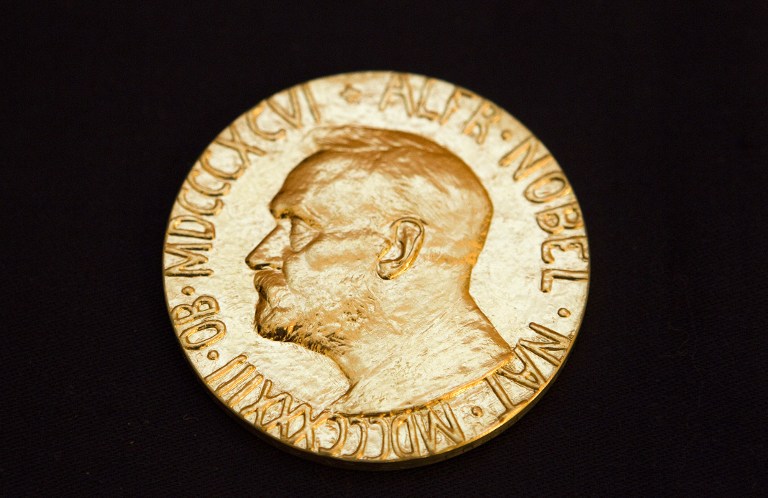SUMMARY
This is AI generated summarization, which may have errors. For context, always refer to the full article.

OSLO, Norway – With a slew of conflicts tormenting the planet, observers say the field of possible winners for this year’s Nobel Peace Prize is wide open, though some suggest it could go to Eastern European activism or the Arab Spring.
Will a theorist of non-violent protests whose ideas inspired the Arab Spring uprisings be honored, or perhaps a Russian or a Belarusian human rights activist? The speculation ahead of Friday’s prize announcement is rife, but so far no one stands out as a clear favorite.
“The Arab Spring, or maybe rather the Arab Autumn, is still dominating the news,” Jan Egeland, a Norwegian who heads the European section of Human Rights Watch, told AFP, pointing out that the uprisings that brought the overthrow of autocratic regimes in Tunisia, Egypt and Libya and rattled others were also at the forefront of Nobel Peace Prize speculation last year.
“What is new is that (the movement) brought hope when the prize was given last year and that it today is rather a source of frustration,” he said.
In 2011, the Nobel Committee in Oslo hailed the wave of protests across the Arab world by handing Yemeni activist Tawakkol Karman the prize, alongside two Liberian women who today are butting heads, President Ellen Johnson Sirleaf and peace activist Leymah Gbowee.
But the protest movement has since seen its share of disillusionment, with the Syrian civil war spiraling ever further out of control, Libya facing militia clashes and a recent deadly attack on the US embassy in Benghazi, and concerns over serious human rights abuses in Egypt and Tunisia.
“One could nonetheless honor those who are fighting for democratic, peaceful change in the Middle East … or who are urging inter-religious dialogue at a time when we are seeing a very dangerous polarization between religions,” Egeland said.
Who to pick?
But who to pick? With a total of 231 individuals and organisations in the running, guessing the winner is a challenge, especially since the identities of most of the nominees are not divulged.
Kristian Berg Harpviken, the head of the Peace Research Institute of Oslo, meanwhile speculated that American political science professor Gene Sharp might snag this year’s prize, pointing out that he is “probably the most important analyst of non-violent struggle techniques.”
Betting sites too have singled out Sharp, whose theories have served as inspiration at massive protests around the globe, including at Tiananmen Square in Beijing and Tahrir Square in Cairo, as the best bet for this year’s prize.
Other names circulating include Afghan human rights activist and burka opponent Sima Samar and Coptic Christian Maggie Gobran, dubbed Egypt’s “Mother Teresa” for her work to help the poor in Cairo’s slums.
Nobel historian Asle Sveen however said the award was unlikely to go to Gobran, pointing to the recent violent and deadly protests over a crudely made anti-Islam film, “The Innocence of Muslims”, apparently produced by a Coptic Christian.
“Giving the Peace Prize to a Copt right now would be equivalent to pouring oil on fire,” Sveen told reporters this week.
Instead, he speculated that this year’s Nobel could go to Belarusian human rights activist Ales Belyatsky, who was detained in August 2011 and jailed after a trial the European Union denounced as “political”.
If he wins, Russian historian and human rights activist Lyudmila Alekseyeva, 85, who heads the Moscow Helsinki Watch Group, might share the prize, he said.
Tightly connected, Belarus and Russia have both recently held criticized elections, allowing authoritarian President Alexander Lukashenko to tighten his grip on power in Minsk and ushering strongman Vladimir Putin back into the Russian presidency.
In a Russia where civil liberties appear under pressure, there are also other possible Nobel winners, Harpviken said, pointing to human rights group Memorial and one of its key figures, Svetlana Gannushkina.
Moscow Echo Radio, described by some as the last bastion of free media in the country, and its chief editor Alexei Venediktov could also take home the prize, he said.
However, other observers say it is unlikely that Nobel Committee chief Thorbjoern Jagland would want to go up against a country he needs to cooperate with in his parallel role as secretary general of the Council of Europe.
Other names making the rounds in Oslo include former German chancellor Helmut Kohl, a key architect of a united Europe today rattled by crisis, Mexican bishop Jose Raul Lopez, Cuban dissident Oscar Elias Biscet and blogger Yoani Sanchez, and the instigators of the Myanmar reform process.
The Nobel Committee will announce up to three prize winners on Friday at 11:00 am (0900 GMT).
The award, consisting of a Nobel diploma, a gold medal and 8.0 million Swedish kronor ($1.2 million, 930,940 euros), will be handed over at a ceremony in Oslo on December 10. – Pierre-Henry Deshayes, Agence France-Presse
Read the full text of President Noynoy Aquino’s speech: Agreement paves way for enduring peace in Mindanao
Read the full text of the Framework Agreement between the Philippine government and the Moro Islamic Liberation Front (MILF) on the establishment of the new autonomous political entity, Bangsamoro, that will replace the Autonomous Region in Muslim Mindanao (ARMM).
For related stories, read:
Add a comment
How does this make you feel?
There are no comments yet. Add your comment to start the conversation.